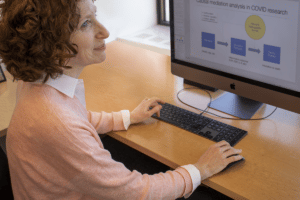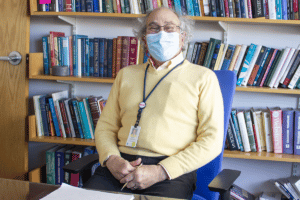History
MGH Biostatistics was founded in 1986 with David Schoenfeld, PhD as its director to provide statistical support for clinical and laboratory research at Massachusetts General Hospital. Since its founding, MGH Biostatistics has expanded both in size and diversity of specialties, forming collaborations with dozens of MGH divisions and departments.
Since its founding, our team has grown to a dedicated staff of over 70—including 23 faculty biostatisticians—who develop, evaluate and apply rigorous statistical and data science methods across a broad spectrum of research areas. These include studies in cancer, cardiology, emergency medicine, psychiatry, pediatrics, infectious diseases, neurology and many other areas of clinical and translational research. We have shared expertise in methods for clinical trials, observational studies, clustered and longitudinal data, missing data, survival analysis, machine learning, genetics and genomics, implementation science, and precision medicine applications. Our members are also engaged in local and global educational initiatives focused on contemporary biostatistical methods and state-of-the-art data science tools.
In 2019, Andrea S. Foulkes, ScD was named Director of MGH Biostatistics, building on the previous decade of leadership by Dianne Finkelstein, PhD. Dr. Foulkes continues the long tradition of leading impactful trans-disciplinary collaborations with clinical investigators while expanding in strategic areas of “big data” science including observational studies and precision medicine applications.
If you are interested in joining our team, explore career openings here or reach out by completing this Affiliation Interest Form.
Mission
MGH Biostatistics aims to engage in impactful trans-disciplinary partnerships involving quantitative methods in public health and biomedicine. This includes collaborating with physician scientists on the development, application and evaluation of rigorous statistical and data science methods to define and address a broad range of hypothesis-driven and exploratory research questions. Translating analytic findings into clinically meaningful discoveries is at the core of our efforts and, to this end, we are deeply embedded in collaborative research teams allowing us to gain and hone subject matter expertise.



Contact Us
MGH Biostatistics
50 Staniford Street, Suite 560
Boston, MA 02114
E-mail: biostat@mgh.harvard.edu
Twitter: @mghbiostat

